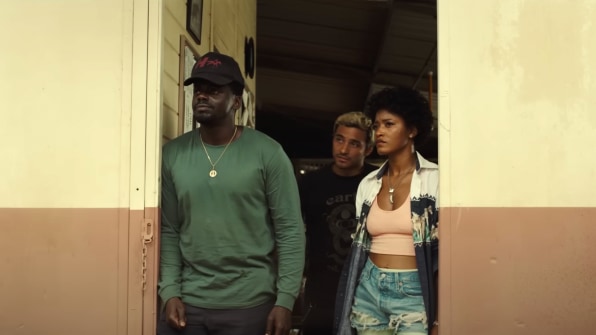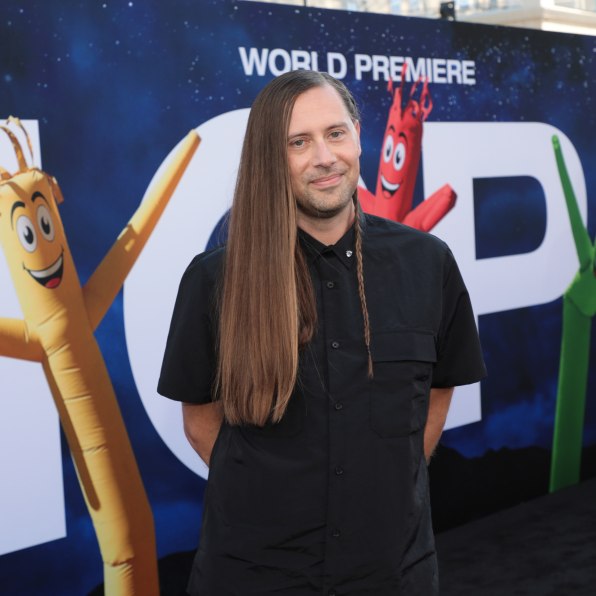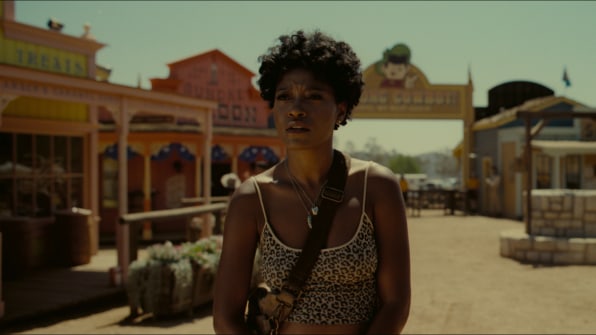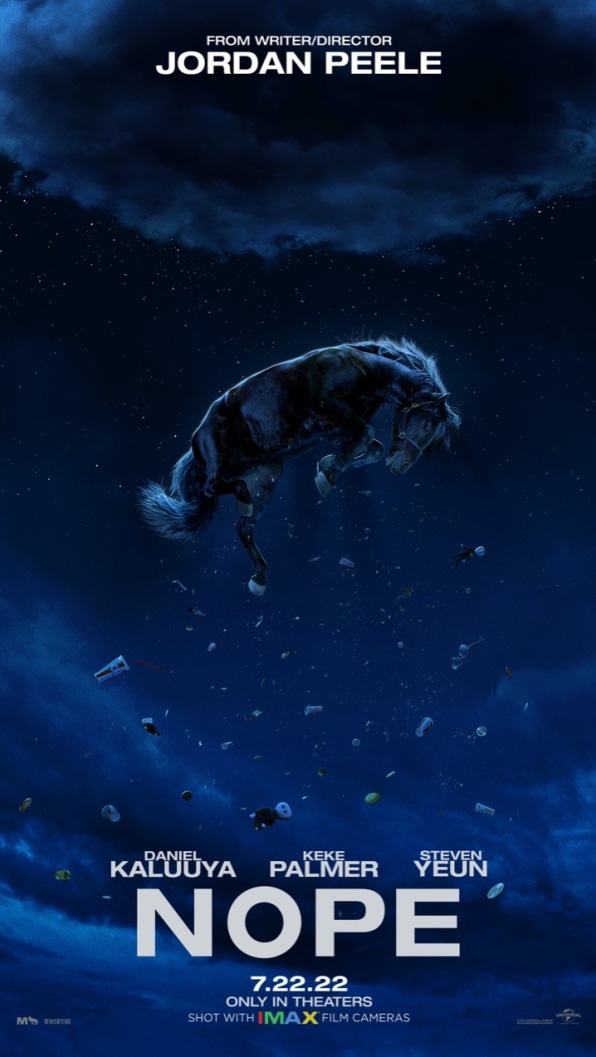[ad_1]
Jordan Peele’s greatest strength as a director has been paying homage to the horror genre while simultaneously pushing its boundaries of storytelling.
Get Out introduced a fresh take on the social thriller. Us spun a home-invasion slasher into an allegory on classicism. Peele’s latest film, Nope, explores the idea of exploitation and spectacle through the lens of an alien invasion.
Peele’s righthand man in executing these bold visions has been his friend of nearly 30 years, Ian Cooper.
As a producer and creative director of Peele’s production company Monkeypaw, Cooper has helped shape Peele’s take on horror, which he describes as “pop darkness,” i.e. films that have an air of hyperbole, “but somehow it goes down smooth.”
Perhaps the greatest testament to that approach is, in fact, Nope, which is billed as reimagining the summer event movie.
Nope follows siblings OJ and Emerald Haywood (Daniel Kaluuya and Keke Palmer), horse handlers working in film and TV, who are struggling to keep intact their late father’s business and legacy in the industry. Not far from the Haywood ranch is a Gold Rush-inspired theme park run by Ricky “Jupe” Park (Steven Yeun), a former actor who’s still grappling with a grisly incident from his days as a child star, when Gordy, a trained chimp and Park’s costar on a TV show, mauled the cast during a live taping. But OJ, Emerald, and Jupe are soon confronted with a different kind of “animal” that they have to learn how to tame.

With the caveat of not answering questions that are too spoiler-y, Cooper breaks down some of Nope‘s creative swings (e.g., that damn bloody shoe, and why you’re definitely going to have unanswered questions), how the film innovates on the sci-fi horror genre, and his collaborative dynamic with Peele.
You and Jordan have been geeking out over films since you were teenagers. How has it been translating that early friendship and bond over cinema into actually working together in the industry?
It’s actually been remarkably fluid. We’ve been close friends since we were 15, and our dynamic that we established both creatively and interpersonally when we were teenagers has remained almost comically unchanged. We each have a son and they’re [around] the same age, and we are already seeing the dynamic transposed across the generations.
So what is that dynamic?
We’re both creative people. I was a visual artist before I became a filmmaker. Jordan had a whole range of visual arts, puppeteering, improv performance, all these things. When we were in high school, we even acted in plays together. So we’ve had this deep exchange of ideas. A lot of it was both conceptual and visual. So I think the origin story of our friendship was a lot about the exchange of ideas and how to conceptually condense ideas into visual language.

So when did that exchange of ideas cement into a working relationship with you as a producer and creative director at Monkeypaw Productions?
When he asked me to change my whole life and move to L.A. and become his producer—which was definitely filed under midlife-crisis feelings I was having—it was super scary. I [had] just completed my MFA. I had been teaching at NYU for 12 years. I was head of the thesis program. I had this whole academic career. And then Get Out, which I helped him as a friend over the six years he wrote it, read and give feedback; once that [film] broke, he was like, what if we just really did this for real as a team? He always says it’s a force multiplier. It’s someone you trust that you have a very intimate relationship with who knows you. I think the nature of the director-and-producer dynamic is so suited to our strengths and our personalities. I don’t want to do what he does, and he probably doesn’t want to do what I do.
Knowing that, how did you begin to develop a film like Nope?
Jordan had this seed of an idea about making a quote-unquote Great American UFO movie for a long time. A lot of first ideas he had around the film were visual. I remember very early on, before there was even a plot to the movie, he had this image of a UFO as an umbrella in a rainstorm, and the feeling it would have to feel rain on the roof of your car or in your house. And then all of a sudden to feel a hard rain wash over you, which is the watershed of the circumference of the UFO, and then all of a sudden be totally without rain—what a horrifying feeling that would be. He thinks very visually and a lot of the way he builds around a movie in the very origins of it is through a series of haunting images.
I find it interesting that the original working title for this film was Little Green Men, which hints at a very different film than what we got with Nope. How much did this film evolve since its inception?
Little Green Men was much more focused on the monetary exchange of exploitation. It was a lot more focused on Emerald and OJ trying to make money from this, which obviously is still still in the movie. But it evolved to a larger discourse around exploitation and the industry. In a way, it’s conceptually more exciting now, and it’s more honest to what Jordan was wrestling with, which is the casualties of spectacle.
What do you see Nope adding to the sci-fi horror genre?
The thing I think is most exciting to me is the idea that we made what feels like a very complex film that actually has a beautiful simplicity. The simplicity is essentially what if a UFO was not a ship that contained organisms—what if it simply was an animal? It was an organism. That was an idea Jordan had pretty early on in the development process and one that we got so excited about, and it felt really risky. But it also felt like almost a meta turn on audience expectation of him having some super complicated twist. He was like, what if the twist was just not that complicated? I also think for a summer movie, it peels back a really beautiful homage to things like Jaws where you’re like, yeah the movie is about a shark that eats people. It’s so simple, but it’s so beloved.
Kind of to that point of simplicity, I’ve noticed, at least with Us and Nope, there’s little in the way of explaining the mythology of the horror we’re introduced to. There wasn’t that much revealed about Tethered. And there’s certainly a lot of remaining questions around this threat in Nope. Where’s the balance between explanation and mystery?
I hope that’s not frustrating for people.

It is a little, but that’s okay.
[laughs] Sorry! What I would say is we always look to Ridley Scott’s Alien. The scariest thing and most grounded thing about that is you get to be alongside your protagonist, and they don’t know what the fuck that is. Jordan does a very funny impersonation of that moment in B movies where a scientist tells you everything that you need to know about the creature. He’s out of breath and kind of sweaty and is like, ‘Listen, back in the 1950s, there was an experiment that went wrong . . . .’ The thing that’s so haunting, and I think Nope does it quite successfully, is, Yeah, man, that’s what would happen if you saw a fucking UFO. There’s no one to tell you shit. There’s no way to know more. The raw groundedness of the fear is being in a circumstance where there is no authority to tell you anything more than you are having an experience that is otherworldly. There’s something about that that allows audience members to continue to touch the movie in their minds. You know when you were a kid and you would lose a tooth and your tongue couldn’t not go in the hole where the tooth was? Something about leaving space for the audience is like they gotta put their tongue in that tooth hole. They want to keep going there and extrapolating. It’s not something where we’re trying to be purposefully obfuscating. It’s trying to root in the experience of the character.
There are little creative touches that really stood out to me in the film, like the title cards that flash on the screen with the names of the different animals. There are cards for the Haywood ranch horses like “Ghost” and “Clover” who meet their untimely end. But there’s also a card for Gordy, the chimp that mauled everyone when Jupe was a child star, as well as the film’s alien creature who’s been dubbed “Jean Jacket.”
We were really hoping that by putting that Gordy chapter there, the audience will be able to make a much cleaner understanding that Gordy and Jean Jacket are no different. They’re both wild animals that man hubristically thought they could put a party hat on and control, until they couldn’t. One other thing I’ll say about this, just on a nerd level, we were so obsessed with those cards and making them feel real. We agonized over the font. We printed them with a fine art photographer, hung them on the wall, and [cinematographer] Hoyte van Hoytema rolled IMAX footage on them. So [those title cards are] real.
Oh wow!
Isn’t that insane? I don’t know if you noticed there was an errant light leak on the cards. So at the bottom of the screen, it almost looks like the foot lamps of a stage. But there was a light leak in the IMAX camera, and we were all so romanced, we just went with it.

Speaking of creative touches, I have to ask: What was with that shoe? In the scene where Gordy mauls the cast, there’s a shoe with a blood stain on it that’s just sticking straight up after the attack?
You know what’s funny? [Hereditary and Midsommar director] Ari Aster texted Jordan and was like, ‘Oh my God—the shoe.” I feel like the shoe is an enigmatic object. For Jupe in that moment, it ends up being a real point of dissociative focus. Basically, everything’s going to hell around you, so as a way of protecting yourself, you focus on an anomalous thing that you can’t not look at. It’s not an image of concretized horror—it’s an associative horror. Coming off of Us, Jordan is really interested in things enigmatically lining up—the world behaving in ways that don’t necessarily make sense, but you can’t help but take notice of. And I think for Jupe, he has [the shoe] in a private museum oriented the same way it was when he witnessed it in reality. It’s almost like a talisman for his way of coping.
There are some production companies that have such a clear identity. A24 is a perfect example. And by now, I’d put Monkeypaw in that category. What, to you, makes a Monkeypaw production?
Our guiding principle is to have people tell stories that represent themselves and help represent others on screen. The other one is fun and artistry. A24 is an amazing company that does such artistic films. We aspire, on the artistry, to be rubbing shoulders with them. But we also are super conscious of making sure we capture a larger audience that is also wanting to just revel in the fun and excitement of being in the movies on a more populous level. The last thing that’s really important to us is this notion of mischief. We don’t settle in and repeat ourselves. And that’s the hardest one actually because it means trusting our instincts, moving past something that we know works in pursuit of something that we hope works. That’s where the risk-taking comes in, and where Jordan is our fearless leader. This movie is a real testament to that.
[ad_2]
Source link

